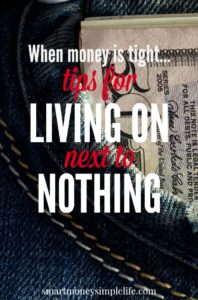It’s easy to be lulled into believing we live in a time of great (and increasing) prosperity. And, on the surface we do appear to be living easier, more comfortable lives than our parents or grandparents.
Time and labor saving devices like dishwashers and drive-thru car washes are a part of our daily existence. We have bigger homes and faster cars and take overseas vacations. Life’s good. Right?
And, maybe it is… for some. For most of us, many of those luxuries are paid for with mortgages, second mortgages, car loans and consumer credit.
In other words, all those things that make life seem so good are actually the things that tie us to jobs we hate and put us at the mercy of the financial system. A system designed to create profit from your debt and mine.
What does all this have to do with the Great Depression?
If you’ve being paying attention to the financial news in recent years, you’ll know we dodged a bullet back in 2008 when the Global Financial Crisis (GFC) hit.
Everything might seem like it’s on the improve; the stock market is climbing, unemployment is falling and property prices are stable. The truth is, the GFC only knocked off the top couple of floors of our house of cards. The house of cards still exists and is being added to each and every day.
One of the reasons I first started exploring the ideas of frugality and simplicity, and self-reliance in general, was the understanding that everything we rely on could come crashing down again with only a moment’s notice. Just like it did back in 1929 when the Great Depression stuck.
That scared me. A lot. Not only from the perspective of finances, but also skills and knowledge. I knew I didn’t have any!
Back in 1929, people didn’t buy convenience meals from the supermarket or burgers at the drive-thru. They cooked at home every day, from scratch. No jars of Chicken Tonight in their pantries!
They also lived in a cash only economy. If money was borrowed, it was borrowed to buy a house or start a business, not for the latest Mulberry handbag.
Homemakers and breadwinners had skills and knowledge we can only dream about now. Or, start learning for ourselves.
This is what I’ve been doing. Some things I’m pretty good at; cooking from scratch, baking bread, vegetable gardening. Others? Well, some others I totally suck at, like carpentry. But, I’m always learning and I’m always trying new ways to add to my self-reliance.
Can you benefit from learning some of these skills and applying what was once commonplace knowledge? I bet you can.
Here are some of the smart money secrets from the Great Depression that are just as useful today and could be lifesavers tomorrow.
Table of Contents
Smart Money Secrets
Waste Not, Want Not

This was my dad’s favorite saying when I was growing up. He was born in 1929, so it was all he knew for the formative years of his life. For me, it’s a central theme to frugal living and covers a multitude of circumstances. From ensuring you have money set aside for emergencies before you consider splurging on a treat to making sure you use the food in your fridge before it goes off. Definitely words to live by!
Cook in Bulk
It takes only a fraction longer to prepare and cook a double batch of a family favorite as a single batch. So, always cook a double batch. The extra batch can be frozen for dinner another day or separated into individual serves for work lunches during the week.
This rule doesn’t necessarily apply to cookies…
This rule is especially true for singles. Cooking for one can seem like too much effort, especially if you’re just cooking enough for one serve. Make sure you cook additional serves to freeze so that you have meals prepared and ready to go for lunches and dinners.
You’re paying for the stove to be on, make the most of it.
Pad your ground beef meals
You can easily extend the meat you use in spaghetti sauce or chili con carne (or anything that uses ground beef) by adding either lentils (I use red lentils) or oatmeal. Both lentils and oatmeal are extremely cheap. They add volume and extra fibre to your meal plus you’ll reduce the cost per serve considerably. This is possibly a smart money secret you’ll want to keep to yourself initially… Not everyone loves the idea of lentils in their lasagna!
You’ll need to experiment to find the right ratio for your tastes.
Always be on the lookout for ways to make extra money
Never pass up the opportunity to put some extra money in your pocket (as long as it’s legal!), especially if it is cash.
There are lots of ways you can make a some extra money that range from mowing the neighbour’s lawn to starting your own blog.
The more sources generating your income, the more resilient you become.
Stop replacing and start fixing
This is a bit harder now than it was back in the 1920’s and 30’s because lots of our possessions are designed to be discarded when they cease to function. However, it’s always worth exploring your options to fix something before running out to the store to replace it. Do your research and crunch your numbers, then make a decision about which option is the best for your circumstances.
Reuse containers and anything else you can
Only the most proficient zero waste enthusiast manages to avoid bringing jars, plastic containers, plastic bags and lots of other things into their homes. For the rest of us, the best thing we can do is reuse them wherever possible.
Not only does it mean less household waste but it also means you don’t need to spend money on storage jars are plastic containers for freezing meals or liners for the kitchen tidy.
Grow your own food
Not everyone has the space, skills or general capacity to plant and maintain a full vegetable garden but you don’t need to in order to add to your available food supplies.
Herbs on a windowsill or balcony or even tomatoes in a pot by the front door. Every little bit helps for both its nutritional value and the flavour it can add to a simple meal.
Use powdered milk for cooking
Powdered milk is an under-rated kitchen staple. It’s cheap. Easy to store and simple to use.
And once you learn how to make a white sauce (roux) your life will never be the same. Not only will you be able to throw away the expensive (and nutrition-free) boxes of mac and cheese, you’ll open up a multitude of meal options to explore. Powdered milk makes those new meal options cheap. In fact, very cheap.
Some of the ways I use powdered milk are:
- Tuna Mornay
- Mac and Cheese
- Cheese-y Vegetable Bake
- Chicken Pot Pie Filling
- Lasagna Topping
- Bread Making
- General baking

Don’t buy anything you can make yourself
Pancake mix. Bread mix. Savoury flavour sachets and sauces.
Cloth kitchen towels instead of paper.
Start with the things you know you can do and build from there. Making pancakes from scratch is easy and cheap, and better for you because you use real ingredients not food-like compounds created in a food scientist’s laboratory. And never underestimate the importance of eating healthily.
Learn to love legumes (beans)
Beans. Not necessarily my favorite food. They are however, an extraordinarily frugal food and the sooner you embrace their innate value, the sooner you’ll get past their less inviting characteristics. If you get my drift.
The first thing to remember when preparing beans is to soak them prior to cooking. Overnight is good, 24 hours is better. When you soak beans before cooking you achieve two things, a quicker cooking time and you remove the phytic acid that can cause digestive and absorption issues. Not everyone agrees about soaking so, try each option and see which works best for you.
Beans are a great way of adding bulk to meat stews and casseroles, and also soups. They can be moulded into burgers, too.
And, you can grow and dry them yourself so they’re a seriously cheap source of protein.
Layer your clothing / dress appropriately for the weather
If it’s cold outside, put on another layer before cranking up the heat inside. Throw an extra blanket on your bed or over your knees if you’re sitting on the couch.
You need to be comfortable but… walking around in a Tshirt and shorts while the heater is working overtime is crazy, wasteful and expensive!
Buy used or get things for free
When a need does strike, and it’s appropriate to do so, do your best to acquire it second hand or free. If you know you’re not going to need the item long term, see if you can borrow it from a neighbour or friend.
If you have to buy it new, buy the best quality you can afford.
Save seeds for use in your garden

Saving seeds from produce you’ve bought or grown yourself has two benefits, the first and most obvious is that it’s a great way to save money. The second is that over time, that plant will begin to adapt to your specific environment. So, always save seeds from the strongest plants.
Note: you can’t save and plant seeds for everything. A lot of plants are hybridised which results in sterile seed. Whenever possible, choose heirloom, open pollinated plants for your vegetable garden.
Buy essentials in bulk
Buying essentials in bulk is only a smart money secret if you’ll use it all before it deteriorates or goes past its use by date, and you can store it safely. Otherwise, you’re just throwing your money away.
The other thing to check is the cost per unit. If you’re buying the bigger version at the grocery store, check to make sure it is cheaper by a unit of measure; volume or weight than the size you usually buy.
I regularly shop at a commercial catering supplier and it’s cheaper for me to buy flour from Aldi (or generic brand at other supermarkets) than it is to buy a 10kg bag at the catering supplier. However, they have 500gm (1lb) bags of spices that work out to be 100 times cheaper per unit than the little sachets at the supermarket. So, know your prices.
Home remedies
Got a sore throat? Try a home remedy like a hot honey and lemon drink, first before racing out to the pharmacy. Or try gargling with a salt water solution.
Another excellent home remedy is an oatmeal bath; excellent for relieving rashes, and other skin issues. Just blitz the oatmeal in a blender or food processor until it looks like flour first.
Note: Use common sense here and see a medical professional if your symptoms persist.
Learn to go without
Everywhere you look there are advertisements telling you what you need to look smarter, fitter, more attractive, wealthier and more successful. All they’re really doing is emptying your wallet.
The smartest money secret there is, is to know the difference between a need and a want and then choosing to stick to needs while you clear your debt and build your savings. Wants can always wait until later.
Save the grease
Yeah, I know. Probably not the healthiest option but, definitely tasty and definitely fits the ‘waste not, want not’ mantra. There are other uses for bacon grease that don’t involve turning left over cooked potato into a tasty breakfast, like bacon grease soap! Don’t believe me? Check out this post by The Hillbilly Housewife!
Use everything to the last drop
Again, this is a great example of waste not, want not. You might think you’re only saving just a few pennies here and there (which is possibly true) but it’s also about changing your mindset from one of waste to one of seeking value.
Add a little water to the conditioner bottle so you can get it all out. Squeeze every last bit of toothpaste from the tube. Add some water to the jar of tomato paste and give it a good shake so you can use all the bits the spoon misses.
When you apply this rule to everything you use, you will notice a difference. The pennies do matter.
Preserve homegrown or cheap seasonal produce
Preserving food is an important skill for every gardener to learn. Important too, for those of us who have access to cheap (or even free) produce when it’s in season.
There are various methods and equipment you can use to preserve food; dehydration, water bath or pressure canning, and freezing. You can learn more about the how to’s on our Well Stocked Pantry Pinterest board.
Library
Your local library is a treasure trove of entertainment, information and community connection, and it’s free! Everyone can find something of value at their local library.
Along with the usual books, magazines, audio books, dvds and now digital books to borrow, libraries also host reading time for littlies, author talks, free internet access and more.
Check your library’s offerings, today.
Use less
Along with making sure you use every last drop is using less in the first place. How much conditioner do you really need for your hair? Do you really need to shampoo twice? Can you still brush your teeth successfully using half the amount you usually do? If your clothes just need a freshen up, will half the laundry powder do the trick?
We often blindly follow the recommendation on the packaging when we really could be using a lot less of the product and still get the same result. Try it for yourself. Test out how much you really need to use to do the job.
Reusable feminine hygiene products
No, not your homemade cloth pads. Try using one of the reusable cups that are readily available, like this one.
Less cost over time and less waste.
Useful entertainment
Instead of sitting on the couch watching TV (and being bombarded by advertising for stuff you don’t need but want now you know it exists), try your hand at hobbies that can add value to your life and possibly create a valuable side hustle, too. It could be woodworking, or crochet or even food preservation. Use your entertainment time wisely.
Compost
This is especially important if you’re a gardener but everyone can compost their vegetable scraps. The less that ends up in landfill the better. If you’re short on space you can use a bokashi bucket. If you have sufficient garden space you can use a compost bin or heap.
Compost is a valuable ingredient for improving your soil and much cheaper (and better for the environment) than buying fertiliser.
You can learn more about making compost here.
Buy generic
Buying generic brands can have a huge impact on your grocery bill. Each grocery chain has it’s own version and some are better than others but most are definitely worth a try. Over the years, I’ve discovered there are some generic versions I wont touch (instant coffee) but many others that are just as good, and often half the price of the branded version. Some examples are; tomato paste, flour, sugar, cheese, powdered milk and butter. All basics that I use all the time in my cooking and week after week, save serious dollars on my grocery bill.
If you haven’t tried them before, ask your friends and family for recommendations are start from there. Mind you, you really can’t go wrong with basics like flour and sugar.
Which smart money secret will you put to use first?
It’s quite a list (thanks for sticking with me to the end!) so there’s bound to be something you can start doing today. Even if it’s just committing to make dinner tonight…Â from scratch.
Start with those things you feel confident you can do and build up from there.
We might never see another Great Depression, and I certainly hope we don’t, but the benefits of learning to do things differently so you can save money and become debt free are worth the effort. You don’t need to live off-the-grid-prepper-style in order to be prepared for any eventuality. You just need to be smart with your money every single day.
While you’re here, why not Download our free Massive Money Saving Checklist?
Other posts you might like:
- 15 Frugal Living Tips – To Get You Started
- 7 Financial Lessons My Grandmother Taught Me
- 21 Painless Ways to Make Extra Money
- Five Savings Goals that will Change Your Life
- 5 Tips for a Successful Spending Freeze
- Stop Impulse Spending with this Neat Trick
- The Power of the Side Hustle
Note: This post contains affiliate links.
P.S. Remember to follow Smart Money, Simple Life on Pinterest, Facebook and Twitter!
